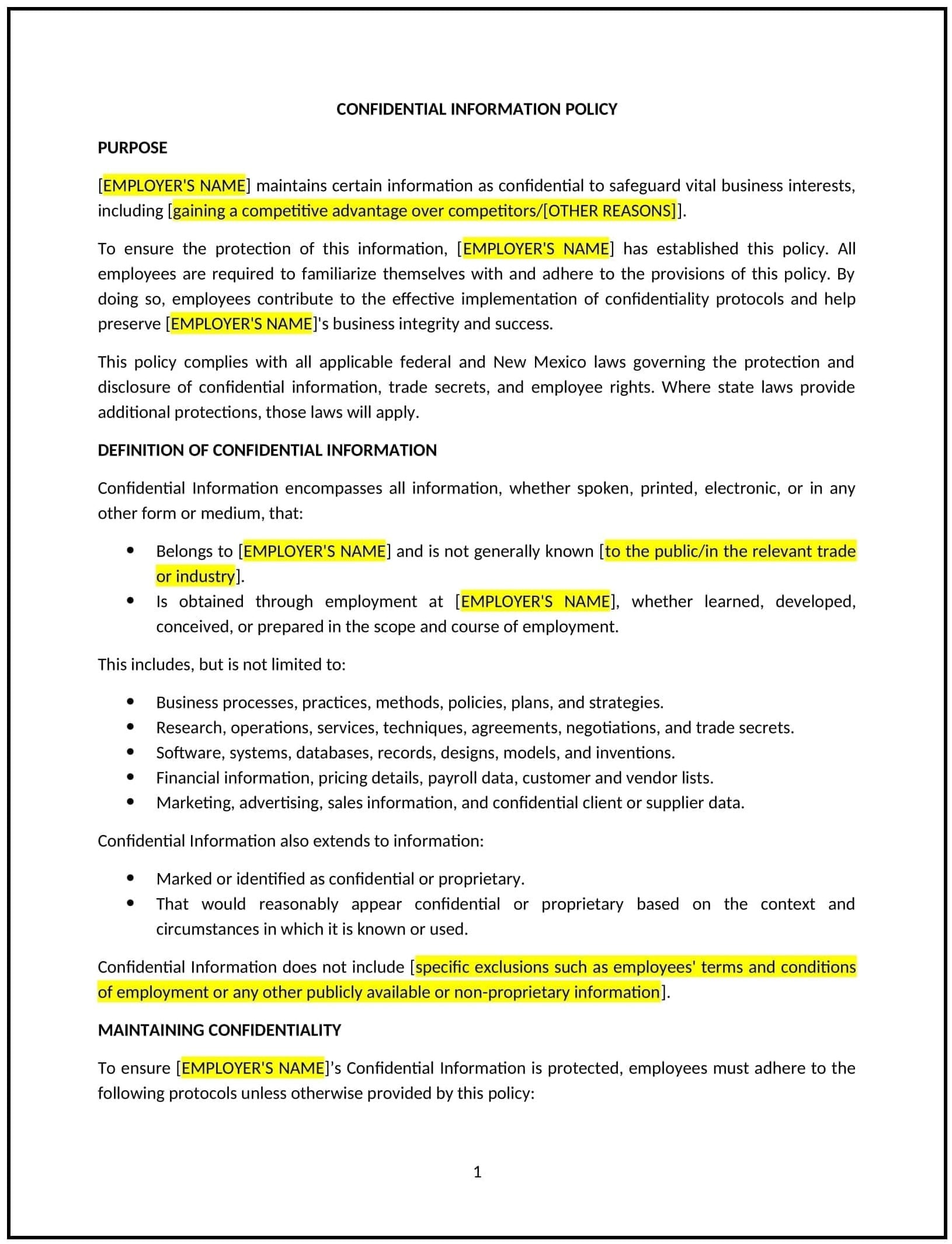Confidential information policy (New Mexico): Free template
Got contracts to review? While you're here for policies, let Cobrief make contract review effortless—start your free review now.

Customize this template for free
Confidential information policy (New Mexico)
This confidential information policy is designed to help New Mexico businesses protect sensitive company data, client information, and trade secrets. It establishes clear guidelines on what constitutes confidential information, how it should be handled, and the responsibilities of employees to protect this information both during and after their employment.
By adopting this policy, New Mexico businesses can reduce the risk of data breaches, protect intellectual property, and maintain a trusted relationship with clients and stakeholders.
How to use this confidential information policy (New Mexico)
- Define confidential information: Clearly outline what constitutes confidential information within the organization, including but not limited to trade secrets, business plans, financial data, client lists, employee information, and proprietary processes.
- Set handling procedures: Specify how confidential information should be stored, accessed, and shared. For example, guidelines for digital security (passwords, encryption) and physical security (locked files, restricted access areas).
- Address sharing of information: Outline when, and with whom, confidential information can be shared. Employees should be told under what circumstances it’s appropriate to share information, such as with authorized personnel or when legally required.
- Set expectations for confidentiality after employment: Establish that employees are expected to maintain the confidentiality of sensitive information even after their employment ends. This can include signing non-disclosure agreements (NDAs) and acknowledging the ongoing obligation to protect company information.
- Reflect New Mexico-specific considerations: Include any specific New Mexico laws or industry regulations that may affect how confidential information must be handled, such as state privacy laws or sector-specific confidentiality requirements.
Benefits of using this confidential information policy (New Mexico)
Implementing this policy provides New Mexico businesses with several advantages:
- Protects sensitive information: Clear guidelines help protect the business’s intellectual property and client data, reducing the risk of leaks or breaches.
- Maintains client trust: By ensuring confidentiality, businesses can build and maintain the trust of clients, which is essential for long-term relationships and the company’s reputation.
- Reduces legal risks: Having a formal policy reduces the risk of legal action due to mishandling of confidential information, ensuring that employees are aware of their legal obligations.
- Promotes a secure work environment: A clear policy helps to foster a culture of security and responsibility within the workplace, encouraging employees to handle sensitive information appropriately.
- Aligns with regulatory requirements: Ensures the company is following New Mexico’s data privacy laws and any industry-specific requirements regarding the handling of confidential information.
Tips for using this confidential information policy (New Mexico)
- Communicate the policy clearly: Ensure that all employees are aware of the policy from the beginning of their employment, and provide regular updates and reminders as needed.
- Provide training on confidentiality: Offer training to employees on how to handle confidential information, including digital security practices, the importance of privacy, and the consequences of breaches.
- Monitor adherence to the policy: Regularly audit access to confidential information and check that employees are following the policy. Address any violations promptly to maintain trust and security.
- Secure physical and digital records: Businesses should implement both digital and physical security measures to safeguard confidential information. This includes encryption, firewalls, secure passwords, and restricted access areas.
- Review the policy regularly: Periodically review and update the policy to ensure it is effective and aligns with any changes in New Mexico privacy laws or the business’s practices.